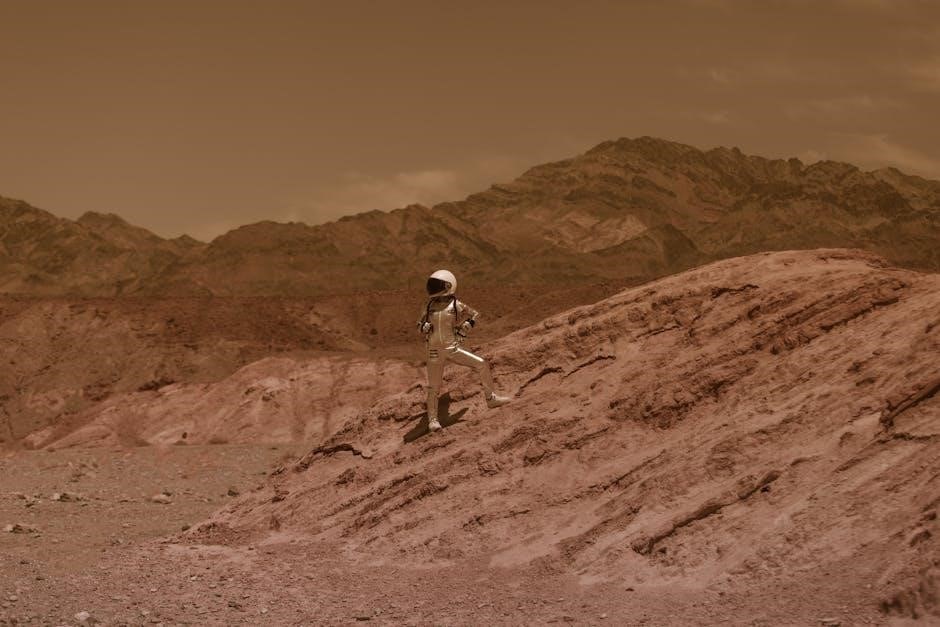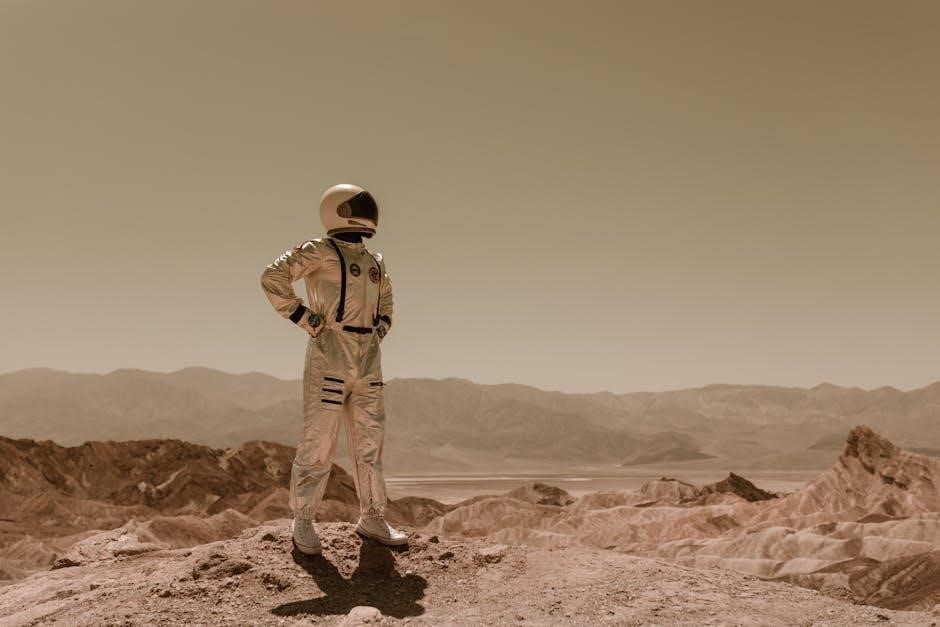The Martian Chronicles by Ray Bradbury is a seminal sci-fi work exploring humanity’s colonization of Mars through interconnected stories. Available as a PDF, it blends poetic prose with profound themes of exploration, technology, and human nature, offering timeless reflections on society’s hopes and fears.
Overview of the Book
The Martian Chronicles by Ray Bradbury is a collection of interconnected short stories that explore humanity’s colonization of Mars. First published in 1950, the book weaves together themes of exploration, technology, and human nature, blending science fiction with poetic prose. The narrative follows humanity’s repeated attempts to settle the red planet, from initial expeditions to eventual transformation. Bradbury’s unique style captures the emotional depth and philosophical questions of a society reaching for the stars. The book is now widely available as a PDF, making it accessible to modern readers. Its timeless insights into hope, loss, and the human condition continue to resonate, solidifying its place as a classic in the science fiction genre.
Historical Context and Significance
The Martian Chronicles, written in the late 1940s and published in 1950, reflects the post-World War II era’s anxieties and hopes. Bradbury’s work critiques colonialism, echoing historical events like the treatment of Native Americans, while exploring themes of technological progress and human frailty. The book’s release coincided with the Cold War, resonating with fears of nuclear destruction and the unknown. Its exploration of Mars as a frontier mirrors America’s westward expansion, offering a cautionary tale about repeating past mistakes. The novel’s enduring relevance lies in its timeless themes, making it a cornerstone of 20th-century science fiction. Today, its availability as a PDF ensures its continued accessibility and impact on modern readers.
Structure and Narrative Style

The Martian Chronicles is structured as a collection of interconnected short stories, forming a cohesive narrative that explores humanity’s colonization of Mars chronologically, blending individual tales with overarching themes.
Interconnected Short Stories
The Martian Chronicles is uniquely structured as a collection of interconnected short stories that intertwine to form a cohesive narrative. Each story explores different aspects of humanity’s colonization of Mars, blending individual tales with overarching themes. While the stories can stand alone, they collectively create a rich tapestry of human ambition, failure, and transformation. Bradbury’s approach allows readers to witness the evolution of Mars as a setting and the profound changes it inspires in those who inhabit it. This structure provides a seamless flow, with each story building on the previous one, creating a unified exploration of humanity’s relationship with Mars. The PDF format preserves this structure, making it accessible for modern readers to experience the interconnected narrative.
Chronological Progression
The Martian Chronicles unfolds across multiple decades, tracing humanity’s colonization of Mars from initial exploration to eventual settlement. The narrative progresses chronologically, with each story building on the previous one, creating a seamless flow. Bradbury’s timeline begins with Earth’s first expeditions to Mars and concludes with a transformed planet, exploring themes of hope, loss, and renewal. This structure allows readers to witness the evolution of humanity’s relationship with Mars and its profound impact on both worlds. The PDF format preserves this structure, making it accessible for modern readers to experience the journey from curiosity to consequence, highlighting the transformative power of human ambition and the enduring allure of the red planet.

Major Themes
The Martian Chronicles explores themes of colonization, human nature, technology, and nostalgia. It reflects on humanity’s flaws, the allure of the unknown, and the consequences of progress, blending philosophical depth with poetic imagery in its PDF format.
Colonization and Its Consequences
The Martian Chronicles critiques humanity’s colonization of Mars, mirroring historical events like the treatment of Native Americans. Bradbury explores how humans repeat past mistakes, exploiting Mars for resources and displacing its indigenous inhabitants. The narrative highlights the tension between progress and preservation, questioning the morality of imposing human dominance on another world. This theme serves as a cautionary tale, urging reflection on the consequences of unchecked expansion and the erasure of alien cultures. The PDF version of the book underscores these themes, offering readers a timeless critique of colonialism and its ethical implications, resonating deeply with contemporary discussions on environmental and cultural preservation.
Human Nature and Existential Reflections
The Martian Chronicles delves into the complexities of human nature, revealing both the noble and darker aspects of society. Bradbury portrays humanity’s innate curiosity and drive for exploration, alongside its propensity for greed, violence, and repetition of past mistakes. The novel critiques societal tendencies like conformity and the exploitation of the unknown, using Mars as a mirror to reflect Earth’s dilemmas. Characters like Jeff Spender, a conflicted and idealistic figure, grapple with humanity’s flaws, symbolizing the moral dilemmas of colonization. The PDF version of the book invites readers to ponder the resilience and flaws of human civilization, emphasizing the need for self-awareness and moral growth in the face of progress and colonization.
Technology and Progress
The Martian Chronicles explores the dual nature of technology and progress, presenting them as both marvels and catalysts for destruction. Bradbury uses rockets and advanced machinery as symbols of human ingenuity, yet critiques the unchecked pursuit of innovation. The novel highlights how technological advancements often outpace moral growth, leading to exploitation and dehumanization. Mars serves as a canvas where humanity’s obsession with progress clashes with the planet’s delicate environment, raising questions about the true cost of civilization and the balance between innovation and preservation. The PDF version of the book underscores these themes, offering a timeless critique of humanity’s relationship with technology and its consequences.

Nostalgia and Longing
The Martian Chronicles captures the bittersweet essence of nostalgia and longing, as humanity reflects on Earth’s comforts while venturing into Mars’ unknown. Bradbury juxtaposes the excitement of exploration with the ache of leaving behind cherished memories, highlighting the tension between progress and the irrevocable loss of innocence. Characters often yearn for a lost past, symbolizing the human connection to what is left behind. This emotional duality underscores the novel’s exploration of change and its enduring impact. The PDF version of the book preserves these poignant themes, allowing modern readers to experience the profound interplay of hope, loss, and the human condition in Bradbury’s timeless narrative.
Ray Bradbury: The Author
Ray Bradbury, born in 1920 in Waukegan, Illinois, was a celebrated American author known for blending science fiction, fantasy, and horror with lyrical prose. His works, including Fahrenheit 451 and The Martian Chronicles, explore futuristic themes and the human condition, making him a cornerstone of 20th-century literature.
Biographical Background
Ray Bradbury, born on August 22, 1920, in Waukegan, Illinois, grew up in a family that nurtured his creativity and curiosity. His early fascination with mythology, science fiction, and fantasy was influenced by his childhood experiences and the stories his parents shared. Bradbury’s writing career began at a young age, and by the 1940s, he was already publishing short stories. In 1947, he married Marguerite McClure, and the couple had four daughters together. Bradbury’s work often reflected his Midwestern roots and his deep exploration of human emotions. The success of The Martian Chronicles in 1950 solidified his reputation as a master of speculative fiction. His ability to blend poetic prose with philosophical insights made him a literary icon, celebrated for works like Fahrenheit 451 and Dandelion Wine.
Bradbury’s Writing Style
Ray Bradbury‘s writing style is renowned for its poetic prose, emotional depth, and philosophical insights. In The Martian Chronicles, he masterfully blends science fiction with lyrical storytelling, creating vivid imagery and a hauntingly beautiful atmosphere. Bradbury’s use of metaphors, such as fire symbolizing destruction and renewal, adds layers of meaning to his narratives. His ability to explore complex themes like colonization, human nature, and technology through accessible language makes his work both intellectually stimulating and emotionally resonant. Bradbury’s unique voice captures the essence of wonder and nostalgia, drawing readers into a world where the boundaries between reality and fantasy blur. His writing continues to inspire, offering timeless reflections on humanity’s aspirations and flaws, now accessible to modern readers through its PDF format.

The Martian Setting
Mars in The Martian Chronicles is depicted as a hauntingly beautiful yet desolate landscape, symbolizing both humanity’s hope for escape and the unknown’s desolation.
Physical Description of Mars

In The Martian Chronicles, Mars is vividly portrayed as a hauntingly beautiful yet desolate world. The planet’s thin atmosphere, vast plains, and distant mountains create an otherworldly backdrop. Bradbury describes the sky as a deep, bloody red, adding to the eerie atmosphere. Ancient rivers and canals, once thriving with life, now lie silent and filled with dust. The landscape is dotted with wine trees and blue phosphorous portraits, blending the alien with the familiar. This physical depiction of Mars serves as a stark contrast to Earth, emphasizing humanity’s longing for escape and the unknown. The environment mirrors the emotional and existential struggles of the characters, blending wonder with foreboding.
Symbolic Significance of Mars

Mars in The Martian Chronicles serves as a powerful symbol of humanity’s aspirations and existential reflections. It represents both a frontier of hope and a desolate mirror of Earth’s flaws. Bradbury portrays Mars as a place of transformation, where humanity’s ambitions and vulnerabilities are laid bare. The planet’s alien landscape symbolizes the unknown, inviting exploration while warning of the consequences of unchecked progress. Mars also embodies the clash between progress and preservation, reflecting humanity’s dual nature—its capacity for wonder and its tendency toward destruction. As a metaphorical frontier, Mars underscores themes of identity, loss, and the enduring human connection to both the familiar and the unknown.
Key Characters
Protagonists like Captain Wilder and Mr. Spender embody humanity’s quest for exploration and understanding, while antagonists, including the enigmatic Martians, symbolize cultural clash and resistance to invasion.
Protagonists and Their Roles

The protagonists in The Martian Chronicles embody humanity’s complex nature and its quest for exploration. Captain Wilder, a determined leader, represents practicality and the drive to establish a human settlement on Mars. Mr. Spender, a philosophical thinker, symbolizes introspection and the moral dilemmas of colonization. Jeff Spender, a conflicted character, grapples with humanity’s flaws and the clash between progress and preservation. These characters’ journeys reflect personal growth, ethical struggles, and the transformative impact of Mars’ mysterious landscape. Their roles explore themes of identity, purpose, and the consequences of human ambition, set against the backdrop of a planet that challenges their understanding of themselves and their place in the universe.
Antagonists and Their Impact

The antagonists in The Martian Chronicles include the enigmatic Martian natives and oppressive human forces. The Martians, with their telepathic abilities, resist human intrusion, symbolizing the unknown and the consequences of invasion. Human antagonists, driven by greed or destruction, highlight the darker aspects of human nature. These characters challenge the protagonists, driving the narrative’s exploration of colonialism, identity, and the clash between progress and preservation. Their impact shapes the story’s themes of conflict and transformation, urging reflection on the consequences of unchecked expansion and the erasure of alien cultures. Through their roles, Bradbury critiques the ethics of colonization and humanity’s propensity for repetition of past mistakes.
The PDF Version
The Martian Chronicles is widely available as a PDF, offering readers easy access to Bradbury’s classic. Published by William Morrow and others, it remains a seminal work in science fiction, now accessible in digital formats for modern readers worldwide.
Availability and Accessibility
The Martian Chronicles is widely available in PDF format, ensuring easy access for modern readers. Published by William Morrow and others, the book can be downloaded from platforms like Internet Archive, PDFCandy, and Sejda. Its digital version is popular due to its convenience, allowing readers to enjoy Bradbury’s poetic prose and timeless themes on various devices. The PDF format preserves the original narrative structure, making it ideal for both casual readers and scholars. With its global accessibility, the novel remains a cornerstone of science fiction, offering insights into humanity’s colonization of Mars and existential reflections. This format ensures Bradbury’s work continues to resonate with new generations of readers.
Popular PDF Versions
The Martian Chronicles is available in several popular PDF versions, including editions from William Morrow and Voyager Classics. These versions are widely downloaded from platforms like Internet Archive and PDFCandy. The 2006 edition, sized at 725.0M, and the 1963 version, at 852.1M, are among the most accessed. Many PDFs include original formatting, preserving Bradbury’s lyrical prose. With over 2,960 views and 37 favorites on Internet Archive, the book’s digital popularity endures. Readers can also find annotated and enhanced versions, offering deeper insights into Bradbury’s work. These PDFs ensure the novel’s timeless themes remain accessible to a global audience, making it a staple in science fiction literature.

Impact and Legacy
The Martian Chronicles is a science fiction classic, influencing literature, film, and music. Its exploration of humanity’s colonization of Mars remains a timeless, thought-provoking masterpiece, inspiring generations.
Cultural and Literary Influence
The Martian Chronicles has left an indelible mark on science fiction and beyond. Its poetic prose and philosophical depth have inspired countless authors, filmmakers, and artists. The novel’s exploration of colonization, technology, and human nature resonates across genres, shaping the way stories about space and humanity are told. Its influence extends to film adaptations, music, and even political discourse, becoming a cultural touchstone for discussions on progress and ethics. Bradbury’s unique style has set a benchmark for blending science fiction with literary artistry, ensuring its relevance across generations. The PDF version has further amplified its reach, making it accessible to modern readers and solidifying its legacy as a cornerstone of 20th-century literature.
Reception and Reviews
The Martian Chronicles has garnered widespread acclaim for its lyrical prose and profound themes. Critics praise its emotional depth and philosophical insights, with many hailing it as a masterpiece of science fiction. Readers have embraced its exploration of human nature, colonization, and existential reflections, making it a beloved classic. The PDF version has further expanded its audience, ensuring its timeless appeal. Reviewers often highlight Bradbury’s unique ability to blend speculative elements with poetic storytelling, creating a work that transcends genre boundaries. Its enduring popularity underscores its influence on literature and popular culture, solidifying its place as a must-read in the sci-fi canon.
